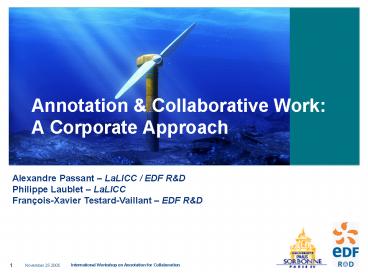Annotation - PowerPoint PPT Presentation
1 / 22
Title:
Annotation
Description:
Blogs to debate or react to information. A wiki as a corporate ... Weblog platform. November 25 2005. International Workshop on Annotation for Collaboration ... – PowerPoint PPT presentation
Number of Views:262
Avg rating:3.0/5.0
Title: Annotation
1
Annotation Collaborative Work A Corporate
Approach
Alexandre Passant LaLICC / EDF RD Philippe
Laublet LaLICC François-Xavier Testard-Vaillant
EDF RD
2
Introduction
- Industrial context
- Integrating external information and common
problems - Objectives to reach
- Knowledge management architecture
- Retrieve and offer value-added information
- Allow people to react
- Build a corporate memory
- Future work
3
Industrial Context
- EDF Research Development
- More than 2000 engineers and researchers
- Various research domains, as renewable energies
- Economic and technologic development monitoring
- Lots of incoming information
- Technologies, patents, actors
4
Gathering and spreading external information
- A team of analysts (former librarians) per
research domain - Manual extraction from web sources
- Online newspapers
- Google queries
- Patents
- Select and resume pieces of information
- Send report via e-mail to engineers and
researchers
5
Problems
- Analysts
- Lots of incoming information to browse
- Loss of time by manually selecting relevant
information - Various domains
- Maintain and organise the diffusion scope
- Engineers / researchers and company
- E-mail is the only way to react to news
- No public archive
- What about a new engineer joining the domain ?
6
Objectives
- Analysts
- More efficience in information retrieval
- Offering value-added information
- Engineer / researcher
- React to the information
- Debate about information
- Share knowledge
- Company
- Up-to-date corporate memory
- Easy access to information
7
How to reach our goals ?
- Texts and annotations
- Information as text metadata references
- Engineer / researcher annotations as the expert
voice - Social tools
- Incitate collaborative work
- Contribute to collaborative work of communities
of practice - Interlinks between web-based tools
- Semantic Web technologies
- A common description formalism
- Ontologies to drive knowledge description
- Ontology based annotations
8
Knowledge management architecture
9
Step 1 Efficiently retrieve and offer
value-added information
- RSS Aggregation Platform
- Advantages
- One central tool for analysts
- A public archive for engineers
- Plus
- A text-analyzer to remove unrelevant items
- An HTML 2 RSS converter
- Value-added information
- ?Annotations
10
Annotations into the aggregator
- Formal automated annotations
- Text-analyzer tags incoming items, eg A new
wave farm has been build in England coasts gt
Tidal_Energies United_Kingdom - The aggregator also includes librarian
annotations publication date, author - Formal manual annotations
- Analysts give a pertinence mark to the content.
Engineers will be able to subscribe news getting
a minimal rank. - Informal manual annotations
- Analysts can add some plain text informal
annotations to the text
11
Step 2 Allow researchers to react to infomation
and to build a corporate memory
- Researchers want to
- Subscribe some domain-feeds
- Capitalize information
- React to pieces of news and debate
- Annotate documents
- Company needs
- An up-to-date corporate memory
- ?Social tools
- A personal RSS subscription service
- Blogs to debate or react to information
- A wiki as a corporate memory
12
From aggregation to subscription
- Feeds by category
- Internal / external
- Refresh frequency
13
Allow researchers to react to incoming information
- A private workspace to publish their own news
- Private / Public / Group access
- Everyone is allowed to comment others entries or
to start a new topic regarding the first one - Formal annotations DublinCore, keywords
- ? Weblog platform
14
A corporate memory
- Our needs
- Engineers and researchers can create pages
- Annotate pages
- Encourage and facilitate collaborative writing of
articles - Users can edit / create / annotate pages
- ? A wiki
- Wikis and blogs
- Blog for a personnal use, wiki to express the
corporate view - Debate on the blog, consensus on the wiki
- Relationship between these tools
15
Wiki annotation example
16
Adding structuration to wikis
- Problems with classical wikis in a corporate
context - Blank page syndrom
- Loss of efficiency in information retrieval
- ?Need to add some kind of structuration to our
wiki - Categories or tags
- Metadata
- Structured XML content
- Semantic metadata and ontologies
17
Our structured wiki prototype
18
Structured wiki and annotations
- Structured content
- Metadata extraction as Title, Company, Technology
- Plain text zones
- Free content
- Informal notes
- Librarians metadatas
- Author
- Date
- Topic
19
Knowledge management architecture with tools
20
Step 3 Easy access to the whole company
information flow
- Need a standard representation format
- RDF(S) ? OWL ?
- One common representation for all our tools
- One ontology per domain as a common vocabulary
- Global ontologies as FOAF or SIOC
- Inferencial capabilities
21
An domain ontology to facilitate knowledge sharing
22
Thank you for your attention
Questions / Discussion































